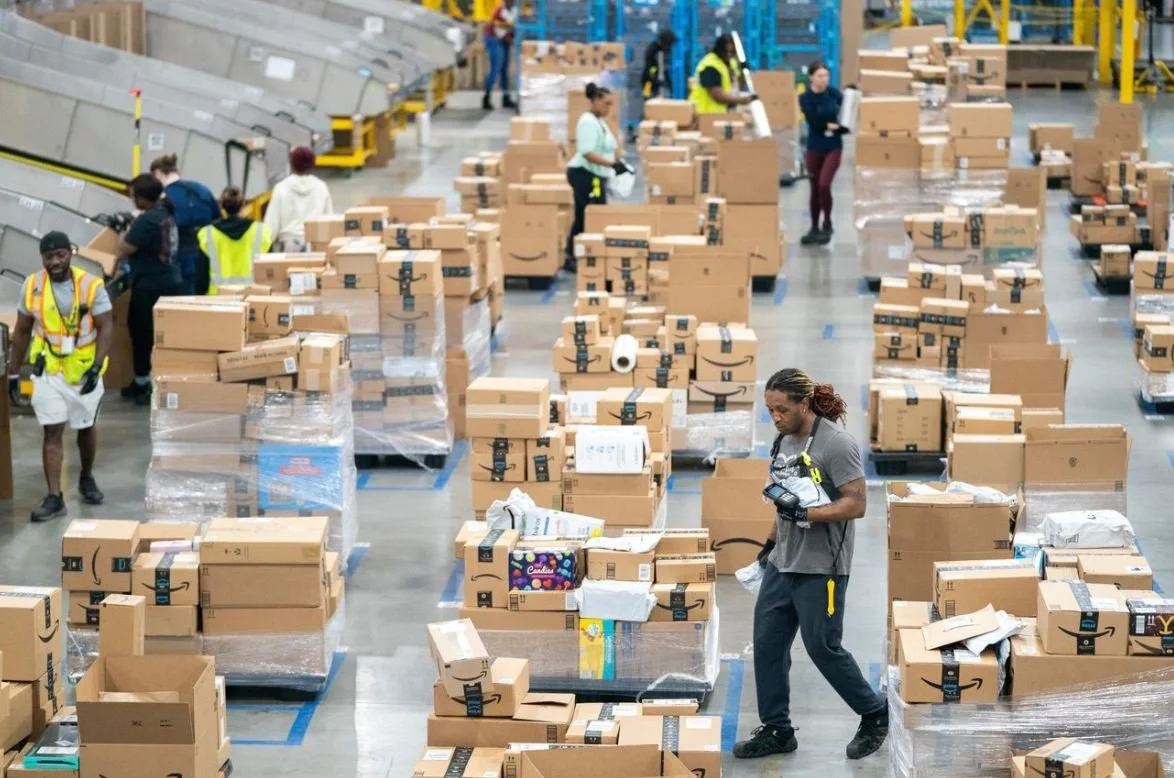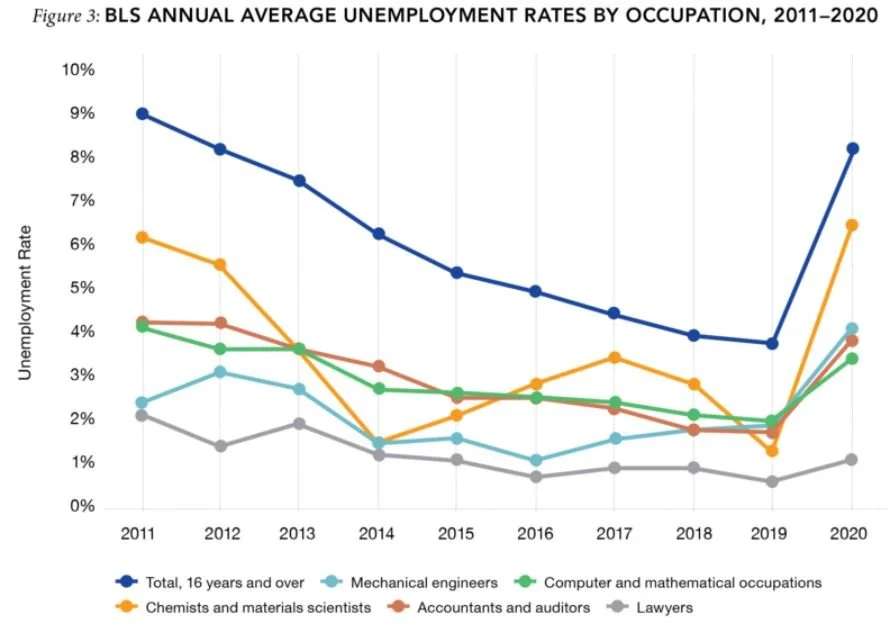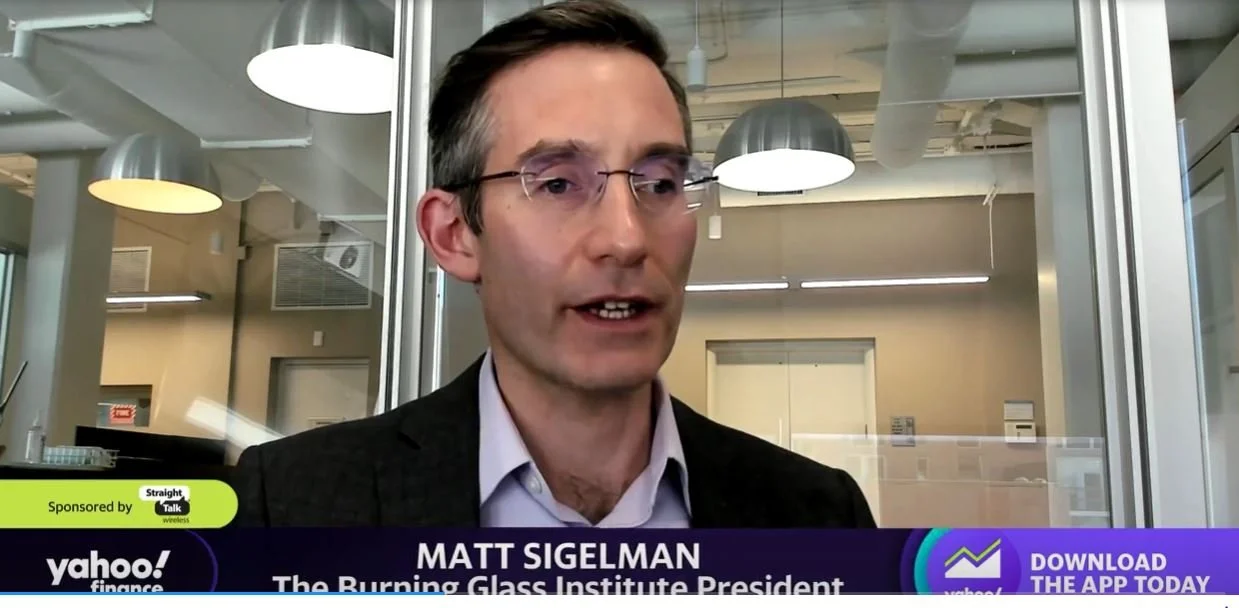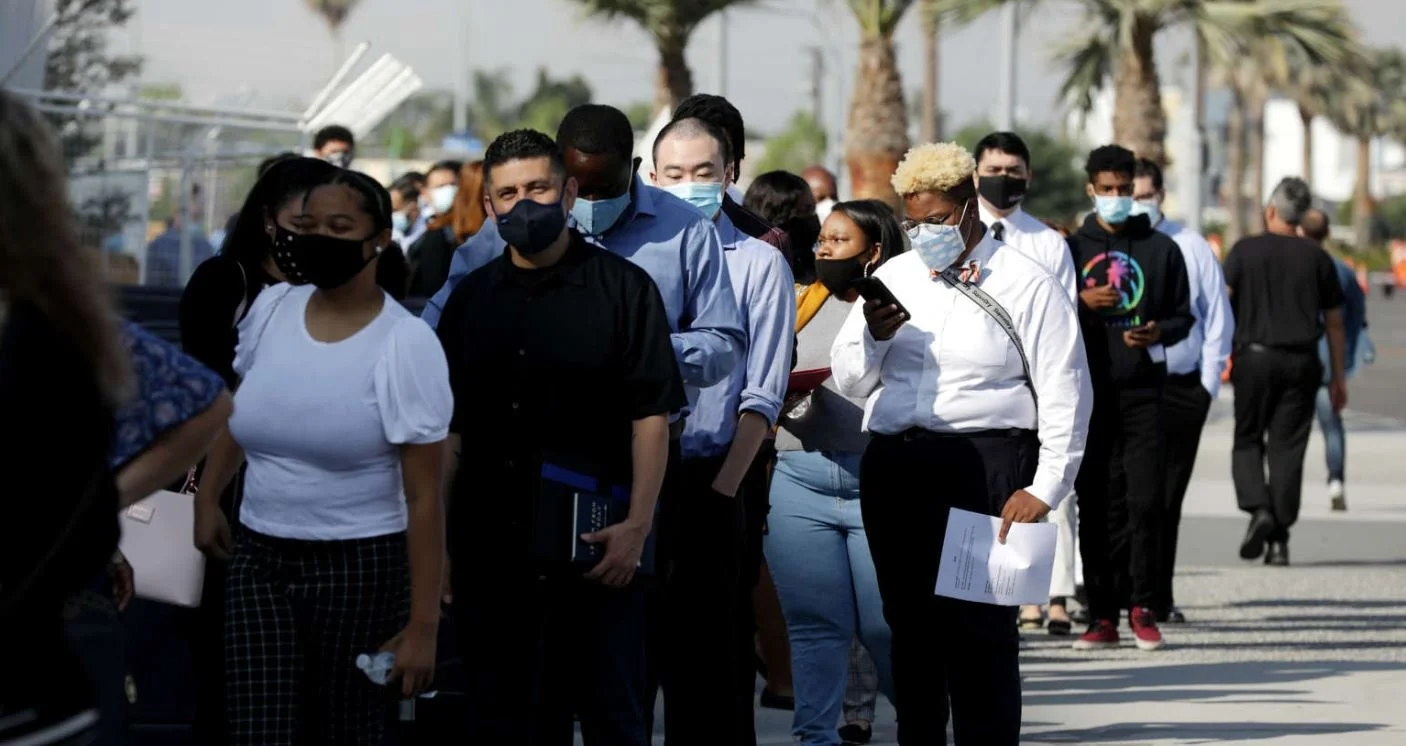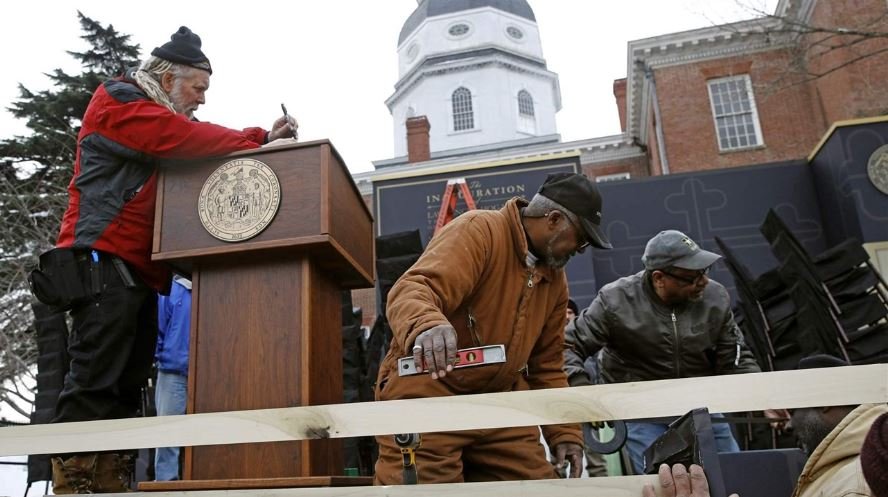News
Articles and op-eds featuring Burning Glass Institute research
Featured Articles
24/7 WALL ST: 22 Jobs With the Fastest-Changing Skill Requirements
November 17, 2022
By Angelo Young
Certain jobs evolve with time -- sometimes the nature of the job changes, and sometimes the necessary knowledge does. The demands from workers therefore can shift as well, in some cases quite rapidly, requiring workers to update their skills fairly frequently in response to the changing environment. Workers in such jobs often develop expertise in new areas -- be it through pursuit of new tasks at work or through additional learning.
“Day by day, skill by skill, the basic building blocks of a job are repositioned, until the role looks much different than it did just five years ago,” said a recent report from The Burning Glass Institute, a Boston-based research group. “Yet the job title -- and the worker in the job -- may remain the same.”
These days, this is especially true of jobs directly involved with the digital environment, from coding to social media. (Also see, these are the highest paying jobs you can get without a college degree.)
A computer scientist might need to learn a new programming language that did not exist just a few years earlier. Data engineers might want to pursue new advances in the related area of data science, making them more valuable to employers for having skill sets in two closely aligned fields. Advertising managers a decade ago needed less experience in online marketing, such as through websites and video streams, than they do today.
Jobs whose skill expectations change rapidly over a short period of time are considered to have a high rate of so-called skill disruption. This rate of disruption varies by job type. For instance, the skill disruptions for a music recording artist is lower than for a website administrator.
To identify the jobs at greatest risk of skill disruption, 24/7 Wall st. reviewed the skills disruption index for 678 occupations from the May 2022 report "Shifting Skills, Moving Targets, and Remaking the Workforce," published by The Burning Glass Institute, a research organization focused on labor in the United States. The report, which covered 2016 through the third quarter of 2021, measures the amount of skill change in an occupation on a scale from 0-100, with 0 being the least amount of disruption and 100 being the greatest.
About 37% of the top 20 skills requested by employers have changed from 2016 to 2021, according to the report. Jobs with the highest level of skill disruption include industrial psychologist, industrial designer, financial quantitative analyst, and robotic engineer. As these job titles suggest, jobs with high rates of skill disruption tend to pay better than those with lower rates of disruption. (Here are 65 jobs with six figure salaries.)
For data engineers, the occupation that scores 100 on the index, close to 75% of the top skills often required for that occupation have changed over the five-year review period.
WALL STREET JOURNAL: Labor Market Mystery: Where Are the Older Gen Z Workers?
Economists search for theories on why fewer people ages 20 to 24 are working or seeking a job
Nov. 13, 2022
By Bryan Mena
The exodus from the labor force in the pandemic’s early months has mostly reversed, but one group remains oddly absent: people in their early 20s.
For people over age 15, the labor-force participation rate—the share of people employed or actively seeking a job—dropped from an average of 63.1% in 2019 to 61.7% in 2021, and recovered to 62.2% in October. But for people ages 20 to 24, participation that averaged 72.1% in 2019 stood at just 70.8% in October.
That equals a shortfall of about half a million workers in their early 20s when comparing the current size of that workforce with 2019 levels…
ISSUES IN SCIENCE AND TECHNOLOGY: A STEM Workforce Debate
ISSUES IN SCIENCE AND TECHNOLOGY:
A STEM Workforce Debate
Fall 2022 Issue
Matt Sigelman
Long out of fashion, industrial policy has come back into vogue, amid bipartisan concerns over economic and military vulnerabilities in an intensifying sphere of global competition. Underlying much of this discussion is the fear that America lacks sufficient STEM talent to carry forward its legacy of technological innovation and to maintain its lead over China. In his article, Ron Hira raises important questions about whether such concerns are supported by the facts.
Hira acknowledges that the lack of availability of detailed data represents a constraint to more effective analysis of imbalances between the supply and demand of STEM talent. As he points out, traditional public data only allow for analysis at the aggregate level, and typically only through a sectoral lens. Just as in any field, STEM roles differ in the skills they require and, correspondingly, in the availability of needed talent, as illustrated in Hira’s article by the contrast between life scientists and software engineers. In the same way that a sectoral lens is insufficient to analyze labor shortages for specific STEM roles, looking only at categories of STEM roles is insufficient to analyze the availability of specific skills in demand in the market. There is no single “skills gap” in the market, but rather different gaps for different skills. Overall, conferred degrees and employer demand in what the Bureau of Labor Statistics refers to as “computing and mathematics” occupations may be in balance, but the pipeline for specific talent can still be severely anemic at the level of specific roles.
This is even more the case when we consider the question of whether existing programs of study are aligned to industry demand at the skill level. For example, while universities may be conferring more than enough STEM degrees to meet demand at the categorical level, these university programs may not be teaching enough of the specific skills that are required by industry, whether those be technical skills such as cloud architecture or soft skills like teamwork and collaboration. Significant gaps between skills taught and skills sought can be as problematic as broader imbalances—but less perceptible…
YAHOO FINANCE: Employee flexibility 'is a lot of the reason why workers stay': Burning Glass Institute president
Yahoo Finance Video
Employee flexibility 'is a lot of the reason why workers stay': Burning Glass Institute president
Burning Glass Institute President Matt Sigelman joins Yahoo Finance Live to discuss the best companies to work at to grow your career and what employees are prioritizing.
Video Transcript
- Welcome back. In today's labor market, you might not need a bachelor's degree to work your way up the ladder and land a strong job. A new index measures which companies are most likely to create economic mobility for workers without college degrees.
Joining us now, we want to bring in Matt Sigelman. He's president of the Burning Glass Institute for today's installment of Career Control, which is brought to you by Straight Talk Wireless. Matt, it's great to see you. So let's get into the index and what you found. The American Opportunity Index. You revealed which large companies are doing it best in terms of advancing workers in the workplace. What did you find?
MATT SIGELMAN: Well, Seana, what we found is that where you work matters a lot for whether you move ahead in your career. We constructed an index to be able to essentially create a yardstick for the American dream. A lot of us are concerned about intergenerational mobility. In other words, do you better than your parents? If you were born in the 1940s, about 90 plus percent of people were going to do better than their parents. If you're born in the 1980s, that was down to at best even odds.
And so what we wanted to look at is the role that companies play in facilitating mobility for their workers. We tracked 3 million workers of the Fortune 250 over five years-- sorry. From 2017 to 2021. And we looked at how they progress, both within their companies and beyond their company.
- And who are the companies that did best? Are they concentrated in particular sectors?
MATT SIGELMAN: So it was actually very interesting to see how broad spread good practice is. If you look at the top companies, you're looking at folks like AT&T on the one hand. Amex. You're looking at Cisco, but also companies like PG&E, Southwest Airlines, International Paper. Across the top 50 companies in America in terms of they're creating opportunity for workers, they represented 21 of the 27 industries that we track…
FINANCIAL TIMES: OPINION: Skills gaps will force companies to do right by their compatriots
By Oren Cass
FINANCIAL TIMES
October 17, 2022
Employers who profited from cheap foreign labour cannot now gripe at having to train local workers
Business leaders who complain constantly of “talent shortages” or “skills gaps” may, in fact, have only themselves to blame. The perceived weaknesses among their staff may be the result of overambitious or flawed plans. Anyone can see the folly in trying to hire thousands of experienced biochemists at minimum wage to develop cutting-edge drugs. The problem is not a biochemist shortage; the problem is the bad idea. Equally foolish is the software executive who expects an unlimited supply of eager coders, or the plant manager who believes well-trained technicians will line up at his door…
New research published on Thursday by the Burning Glass Institute, Harvard Business School, and the Schultz Family Foundation…show[s] how much better employers can do. The American Opportunity Index uses data from millions of online job ads and CVs to analyse the career paths of US workers, typically without college degrees, through the nation’s 250 largest publicly traded companies. The index focuses on three dimensions of opportunity that employers provide: access (hiring of entry-level workers and those without college degrees), pay (median wage offered in each occupation) and mobility (how far and fast workers are promoted, how long they stay and how successful they are moving on to other companies)…
THE DALLAS MORNING NEWS: AT&T, HF Sinclair, Southwest Airlines among best for career mobility without a degree
By Natalie Walters
The Dallas Morning News
October 17, 2022
A new study identifies the companies that give workers the best career mobility without requiring a college degree, and three Dallas companies made the list.
The project, led by Philadelphia think tank Burning Glass Institute, used publicly available data to assess the 250 largest U.S. public companies. They call the rankings “a corporate scorecard of worker advancement.”
Topping the list is Dallas-based telecom giant AT&T. Other Dallas firms in the top 10 were oil company HF Sinclair and Southwest Airlines.
The researchers looked at career histories, job postings and salary sources to determine the companies that provide the most help for career advancement for workers in roles that don’t require a college degree.
The five-year study measured accessibility, or who is able to join the company; wages, or how well they’re paid; and mobility, or how high up the worker advances either at their original employer or a new one…
WALL STREET JOURNAL: Want to Get Ahead? Pick the Right Company
By Lauren Weber and Theo Francis
The Wall Street Journal
October 14, 2022
Want to Get Ahead? Pick the Right Company
The best places to advance your career, get groomed for bigger opportunities elsewhere and find job stability, as determined by a new study. A college degree isn’t necessarily required.
Retail workers at Gap Inc. are significantly more likely to become managers than at other companies in their industry. Apple Inc. is among the best places to work if you want to land a bigger job elsewhere. For employees seeking security, few companies offer better job stability than Exxon Mobil Corp.
These are among the findings of a new five-year analysis of career mobility for millions of U.S. workers led by Philadelphia think tank Burning Glass Institute, focusing on jobs that don’t necessarily require a college degree. Certain companies, it turns out, excel at helping workers in these jobs move up the career and pay ladder. At other firms careers can stagnate, even within the same industry. New skills at those firms don’t always translate into promotions, higher wages or more opportunities to advance…
CNN BUSINESS: Opinion: The Fed doesn’t have a choice anymore. Get ready for a recession
By Gad Levanon
CNN Business: Opinion
October 7, 2022
To many economists and analysts, the US economy has represented a paradox this year. On the one hand, GDP growth has slowed significantly, and some argue, even entered a recession. On the other hand, overall employment growth has been much stronger than normal.
While GDP declined at an annualized rate of 1.1% in the first half of 2022, the US economy added 2.3 million jobs in the last six months, far more than in any other six-month period in the 20 years prior to the pandemic.
This tight labor market – and the rapid wage growth it has spurred – is causing inflation to become more entrenched. The Consumer Price Index, which measures a basket of goods and services, was 8.3% year-over-year in August. That’s lower than the 40-year high of 9.1% in June, but still painfully high. To address it, the Federal Reserve is likely to drive the economy into a recession in 2023, crushing continued job growth.…
TECHPOINT AFRICA: University degrees are becoming less important for high paying jobs, here’s how you can take advantage
By Oluwanifemi Kolawole
Techpoint.africa
September 14, 2022
Per a 2022 Tech Work Report, tech founders have become more flexible with their hiring requirements such that a university degree might not be necessary to fill a middle-skill or even high-skill role.
More prominent companies are also taking this stand for many reasons, the most obvious being a shortage of tech talent.
Potential hires can still be at a disadvantage if they lack the required skill and experience.
Besides the combination of qualifications that an employer would typically specify for a role, recruiters also have specific skills they often look out for during recruitment. Passion, potential to improve, ability to communicate and collaborate, and an impressive track record are only a few.
Usually, this track record would highlight academic achievements, especially when the candidate is only just beginning their career journey. As is standard practice, an excellent graduate degree makes a good first impression when it comes to job search. But it seems the conversation is changing….
COMPUTERWORLD: Q&A: From parkourist to data analyst — how upskilling launched a tech career
By Lucas Mearian
Senior Reporter, Computerworld
September 13, 2022
Bailey Shaw, a 23-year-old parkour expert with no tech background or college degree, was able to land an entry-level job with a software vendor where he spent the next year learning low-code development tools. He's now a junior data analyst.
With the unemployment rate hovering just above 2% for tech workers, companies are focusing their recruitment efforts on skills-based hiring and dropping college degree requirements.
Among middle-skilled occupations, the openings that require college degrees are for the most part similar to those for which no degree is required, according to a recent study by Harvard Business School’s Project on Managing the Future of Work and the Burning Glass Institute.
“Jobs do not require four-year college degrees. Employers do,” the study noted….
CHICAGO TRIBUNE: Matt Sigelman and Ken Mehlman: Airline meltdowns are the canary in the coal mine
Matt Sigelman and Ken Mehlman: Airline meltdowns are the canary in the coal mine
By Matt Sigelman and Ken Mehlman
August 31, 2022
For would-be vacationers, this has been the summer of our discontent. In the wake of the pandemic, severe staffing shortages have triggered a crush of disruption: Flight cancellations abound while check-in lines snake out the terminal door. Travelers wonder when the chaos will abate.
But what if this isn’t just a temporary hiccup? This summer’s air travel meltdown could well be the canary in the coal mine for the labor shortages we may soon experience across the economy as boomers retire, population growth slows and training lags. To avoid further shortages, we must rethink how we invest in workers and start planning ahead.
Across sectors, today’s problems have been a long time coming. For those who think travel headaches are simply the product of pent-up wanderlust, consider this: According to the labor market analytics firm Lightcast, job openings for pilots have grown 72% since 2016 while the number of pilots at work has grown only 12%, a profound gap that demonstrates just how many jobs are going unfilled…
AUDACY: More companies hiring based on skills than education
More companies hiring based on skills than education
By Joe Hiti
August 11, 2022
With the United States economy adding more than 500,000 jobs across nearly every sector in July, new research suggests that education isn't as important as a candidate's skills are.
The research comes from The Burning Glass Institute, which has found that jobs requiring a four-year degree have steadily decreased over the last half-decade. A survey from the Harvard Business Review in April also found the same trend.…
CNBC: These 3 hacks can help you land your dream job right now, according to career experts
These 3 hacks can help you land your dream job right now, according to career experts
By Morgan Smith
August 3, 2022
The latest labor market forecasts are confusing at best: amidst fears of a looming recession and layoffs at high-profile companies, the number of new hires and people who quit their jobs in June remained incredibly high, according to the latest JOLTS report.
Still, it’s not a bad time to find your dream job. “Hiring has slowed a bit, but the good news is that it’s still a job-seeker’s market, and there are still a ton of opportunities out there,” LinkedIn career expert Blair Heitmann tells CNBC Make It, adding that hiring has been especially strong in health care, media, construction and financial services industries as of late.
Even if the economy takes a turn for the worse, the typical recession lasts less than 18 months — so, ultimately, “there’s a light at the end of a tunnel, and you’ll be able to find a job … it might just take a little longer,” career coach Emily Liou says.
Building your confidence in the job search and knowing exactly what hiring managers are looking for can help speed up the process of landing your dream job, regardless of the state of the economy.
Here are three tips from career experts to maximize your search…
TRUTHOUT: 75% of New Jobs Require a Degree While Only 40% of Potential Applicants Have One
75% of New Jobs Require a Degree While Only 40% of Potential Applicants Have One
By David Trend
August 7, 2022
In recent years, amid college admissions scams and student debt, a new debate is emerging around higher education. An increasing number of people are questioning the “paper ceiling” — the barrier for skilled job seekers who lack a bachelor’s degree. The education press is calling this an ontological threat in that it questions the existence and value of college itself, while accusing the system of perpetuating multiple forms of inequity. Of course, higher education often has found itself a political football in the past. What makes this time different is its critique of functions universities typically have seen as their strength: providing skills for employment and meaning for life.
Everyone knows it’s been a tough few years for higher education. With enrollments dropping during the pandemic at a pace not seen for half a century, concurrent changes in the U.S. workplace have rendered college degrees unnecessary for a growing number of high-wage jobs. Yet many employers require four-year credentials anyway, in what some observers see as an antiquated habit and a cover for discrimination.
The numbers are deceptively simple: 75 percent of new jobs insist on a bachelor’s degree, while only 40 percent of potential applicants have one…
GOBankingRates: Is the Latest Jobs Report Signaling a More Aggressive Fed Hike?
Is the Latest Jobs Report Signaling a More Aggressive Fed Hike?
By Yaёl Bizouati-Kennedy
August 8, 2022
The U.S. added 528,000 jobs in July, largely beating estimates, and unemployment was at 3.5%, the Bureau of Labor Statistics (BLS) reported last week. The blowout report is reigniting several economists’ views that the Federal Reserve might move more aggressively at its next meeting in September.
Rusty Vanneman, Chief Investment Strategist at Orion Advisor Solutions, told GOBankingRates that the job report was impressive, especially considering the recent rise in jobless claims, announced layoffs at giants such as Amazon and Walmart, and the recent drop in job openings. He summed it up by saying that it “felt like the expected number of 250,000 was going to be too high”…
Forbes: How EdTech Firms Are Bringing Higher Education To The Metaverse
How EdTech Firms Are Bringing Higher Education To The Metaverse
Remote learning might’ve gotten a bad rap during the pandemic, but education is about to move into the metaverse. And, experts say, it will be better than in-person instruction.
The costs of higher education have been growing, racking up more debt for students, and the post-college economic returns have been flattening. But learning has never been more important, especially in an era of rapid technological and growing automation.
Unfortunately, traditional higher educational institutions are not equipped to handle the scale of the challenge. “The class of institutions we need going forward isn’t fully fleshed out yet,” said Michael Crow, president of Arizona State University. “Redesigning research universities will require innovative institutional models that creatively use learning technologies to cooperate rather than compete with other universities, and forming strategic partnerships that include business and industry and government agencies,” Crow said…
The Washington Post: More workers without degrees are landing jobs. Will it last?
More workers without degrees are landing jobs. Will it last?
The increasing availability of good jobs for those without degrees coincides with challenges for traditional higher education
By Lawrence Lanahan
Troy Groom, of Hyattsville, Md., was browsing social media this spring when he read something that made him perk up: Gov. Larry Hogan (R) announced in March that the state government would strip bachelor’s degree requirements from thousands of job listings.
Groom had left Bowie State University when his first daughter was born. That daughter now has a college diploma. Groom still does not. But he had gained experience and credentials: a two-decade rise in retail and a suite of computer networking certificates that led him to three years of information technology contracting gigs…
PEW: This State Will Hire You—No College Degree Required
June 23, 2022
By: Elaine S. Povich
With record numbers of state jobs going unfilled since the height of the COVID-19 pandemic, Maryland was in a bind. So, officials decided to eliminate the four-year degree requirement for thousands of those jobs—from parole agents to information technology specialists to nursing assistants—becoming the first state to do so.
In the current tight labor market, Maryland is not the only state engaged in a desperate search for government employees. Unemployment remains low, and there are millions more job openings in both the public and private sectors than there are workers to fill them.
Some private companies already have scaled back education requirements in the race to attract employees. It makes sense for states and other public sector employers to do the same, according to Harvard Business School economics professor Joseph Fuller, who has studied the trend…
FORBES: 3 Ways To Tackle Hiring’s Mammoth Bias Problem
June 30, 2022
Laura Thompson and Krysta Sadowski
The shift toward skills-based hiring is part and parcel of improving racial equity in the workplace, but even the most well-intentioned hiring initiatives can fall flat if bias is not addressed.
The skills-based hiring movement is growing. A Burning Glass Institute analysis of more than 51 million job posts found that employers removed degree requirements for nearly half of middle-skills roles and more than one-third of high-skills roles between 2017 and 2019. And federal, state and private sector employers appear poised to accelerate this trend. This shift is partly driven by the call for improved diversity, equity and inclusion (DEI) outcomes in the workforce and the recognition of skills-based hiring as a conduit for advancing racial and economic equity.
But as companies work to make this shift, we’re noticing a risk: Skills-based hiring efforts could fall flat if HR teams do not also invest in addressing the ways in which bias can impact hiring processes…
AEI: Harnessing the Best of Automation While Minimizing the Downside Risks
American Enterprise Institute
By John P. Bailey
The pandemic and economic disruptions have accelerated the adoption of automation technologies that will introduce important benefits to businesses and consumers but may also create disruptions for many workers and communities. Policymakers and leaders can take steps now to help navigate these disruptive changes…


